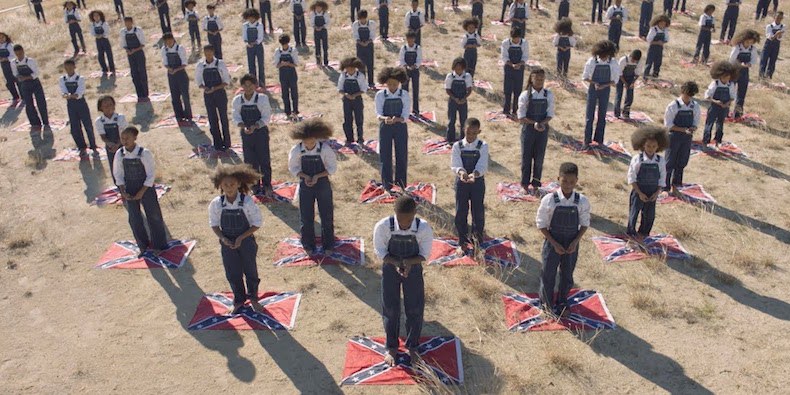Teaching the American dream and identity? Two score and sixteen years ago, civil rights activist Malcolm X climbs the rostrum at Cory Methodist Church in Cleveland, Ohio to deliver his seminal speech “The Ballot or the Bullet”. The speech defines a pivotal moment in American political history – a time at which the civil rights movement is´at a crossroads and must choose a new way forward.

On April 3 1964, there is no American dream available to Malcolm X only an American nightmare. The non-violent approach to the civil rights struggle advoctated by Martin Luther King has shown its limitations. Racial equality, it seems, cannot be reached solely by political negotiation and demoratic vote.
The time has come for fighting “by any means necessary”. The black community must be willing to take up arms against their oppressors. To achieve freedom and equal opportunity, X argues, black people must choose the bullet over the ballot and bring about a revolution on the streets of America.
A Bullet for Demoracy
If Malcolm X spoke in a time of violence and political division, then the politcal landscape of the 2020 presidential election seems even more hostile and polarized. When X wanted to take a bullet to the American system of government, he could hardly have imagined that 50 years later the men bearing the gun would work inside the system itself.
In 2016 president Trump boasted that he could “shoot a man on Fifth Avenue and get away with it”. In the beginning af 2020, he did just that. Power “by any means necessary” seems to be the only governing principle left in US politics. By refusing to check and balance power, congress has given up on the fundamental principle underpinning the political system in America. At the same time, the judicial system does not function independently but rather as an extension of the executive branch.
The authoritarian turn in American politics is explored further in this interesting piece by Adam Serwer in The Atlantic: “The First Days of the Trump Regime”. In this context, the challenge comes from an ideologically disparaged left-wing that bear many similarities to the contest between George McGovern and Richard Nixon in 1972 as set out in this article by Derek Thompson: “Bernie Sanders is George McGovern”
You might also like: http://www.inkshed.dk/2019/12/06/american-histories-watchmen/
To Sleep Perchance to Dream
In the context of the 2020 presidential election, this module explores central American myths and values across a wide selection of cultural expressions.
Through political speeches, excerpts from history books, fiction and film; central American concepts like the American Dream, the frontier, immigration, democracy, family and freedom will be investigated and discussed. The core issue of this module is to trace the development of these myths from their conception until today. In texts ranging from the Declaration of Independence to the Gettysburg Address. From Kennedy’s new frontier to the dreams and promises of King and Obama. And finally on to the authoritarian vision of Donald Trump.
While the main emphasis will be given to rhetorical analysis of political speeches and non-fiction writing, film and fiction will be brought in to place these in a wider historical and cultural context.
The mainstay of the module will be the chapter “USA – From British Colony to Superpower” in Finderup and Fog, Worlds of English (Systime 2010)
Different visions of the American Dream: http://www.inkshed.dk/2020/02/26/a-sense-of-place/
Core Materials
Emma Lazarus, The New Colossus (poem, 1883)
The Declaration of Independence (1776)
Preamble to The Constitution of the United States of America (1787)
Abraham Lincoln, The Gettysburg Address (Speech, 1863)
Edward N. Kearney, The Frontier Heritage (Non-Fiction, 1984)
John F. Kennedy, The New Frontier (Speech (excerpt) 1960)
John Steinbeck, The Leader of the People (Short story, 1933)
Martin Luther King, I Have a Dream (Speech, 1963)
Malcolm X, The Ballot or the Bullet (Speech, 1964)
Barack Obama, Victory Speech (2012)
The Sixties The Years That Shaped a Generation (PBS, Documentary, 2005)
The Killers, Land of the Free (Music Video, 2019)
Gary Clark Jr., This Land (Music Video, 2019)
Childish Gambino, This is America (Music Video, 2018)
Donald Trump, State of the Union Address (Speech, 2020)
Mitt Romney, Remarks on Impeachment Vote (Non-Fiction, 2020)
Alan Parker, Mississippi Burning (1988) or other film
Secondary Materials
West Wing (Pilot Episode)
John F. Kennedy, Rice Moon Landing Speech (video-clip)
Helle Birk, The Election of the American President (Non-Fiction, in American Issues, Systime, 2008)
Mitt Romney, RNC Speech 2012
Barack Obama, DNC Speech 2012
Language and Analytical Tools
Some differences between British and American English (Handout)
American English (from Worlds of English)
Non-Fiction Analysis (Handout)
The Communication Model (Handout)
Rhetorical Devices and Forms of Appeal (Worlds of English)
Adam Serwer, The First Days of the Trump Regime (Non-Fiction)
Derek Thompson, Bernie Sanders is George McGovern (Non-Fiction)
Who killed Malcolm X (Netflix documentary)
Alec MacGillis, The Despair of Poor White Americans (Non-Fiction, 2016)
In the News
In each lesson a pair of students give a short talk on a current news issue in the US Media.